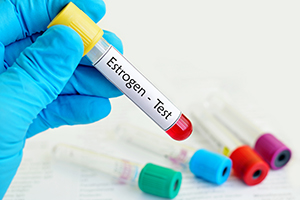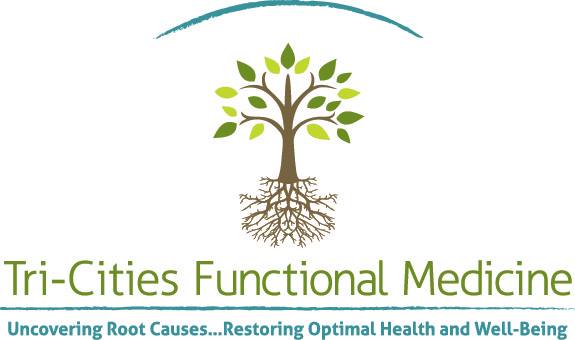Estrogen Level Testing in Johnson City, TN

Puberty. Fertility. Menopause. All our biochemical life stages are regulated by hormones – the body’s chemical messengers. Unbalanced hormone levels can cause many health conditions.
Primarily produced in the ovaries, estrogen plays an important role in a woman’s puberty and menstrual cycle, and menopause. Men’s levels are much lower, but also fluctuate during andropause (age-related decline of testosterone), affecting the bone and reproductive health.
A healthcare provider may use estrogen level tests—usually a blood test—to diagnose imbalances during puberty, fertility challenges, menopause, and andropause. To learn more about estrogen level testing in Johnson City, call (423) 301-6964 or contact Tri-Cities Functional Medicine online.
What Does Estrogen Do?
Estrogen stimulates these physical changes that differentiate women from men:
- breast development
- thinner hair that’s less-susceptible to balding
- smaller and shorter bones
- broad pelvises and narrow shoulders
- smaller voice box and shorter vocal cords
- increases fat around the hips and thighs to make the body curved and contoured
Estrogen generates the growth of an egg follicle during a woman’s menstrual cycle, stimulates the growth of the vagina to its adult size, and helps move the egg and sperm cells during fertilization.
What Do Estrogen Level Tests Detect?
Women may get an estrogen level test to diagnose:
- Infertility
- vaginal bleeding after menopause
- menopausal symptoms like hot flashes and irregular menstrual periods
- to monitor hormone therapy for symptoms of menopause
- early or late sex organs development
- pregnancy
Men may have estrogen levels tested to:
- detect late onset puberty
- diagnose reason for enlarged breasts (gynecomastia)
- diagnose low testosterone or androgen levels; with age testosterone levels decrease, and estrogen levels increase
- detect estrogen-producing tumors
An estrogen test measures any of three forms of the hormone:
- estrone (E1): a weak form of estrogen found in women after menopause; estrone can be converted into estradiol, and estradiol to estrone
- estradiol (E2): a steroid produced in the ovaries; it’s the strongest type of estrogen, and may contribute to cancers that occur in females
- estriol (E3): the waste product of used estradiol, it’s the weakest estrogen and becomes the main estrogen during pregnancy
How Is An Estrogen Level Test Performed?
Blood test
Blood is extracted from a vein in your arm. Before undergoing this test, tell your healthcare provider if you take the following medications, as they may affect your results:
- birth control pills
- antibiotics such as ampicillin or tetracycline
- corticosteroids
- hormone supplements like estrogen, DHEA, and testosterone
- medicine to manage mental disorders
The needle used in the test may cause some mild pain and bruising. Risks of this test are rare but can include excessive bleeding or hematoma (blood accumulating under the skin), fainting or lightheadedness, and infection.
Estrogen Dominance Test
From a sample of your saliva, this test measures progesterone and estrogen (estradiol) levels. Results include the progesterone-to-estrogen ratio, an indicator of estrogen dominance, which is an imbalance of the hormones progesterone and estrogen.
What Do Your Results Mean?
What is a healthy estrogen range? That depends on your age, gender, and health conditions you’re trying to treat of prevent.
Depending on your estrogen test results and your symptoms, your healthcare provider may recommend other tests to help pinpoint a diagnosis, such as a test that check levels of follicle-stimulating hormone (FSH). FSH manages the menstrual cycle in women and prompts the production of sperm in men.
As with any medical procedure, results of estrogen testing vary from patient to patient, depending on age, genetics, environmental conditions, and other health factors.
High Estrogen Levels
High estrogen levels in men can cause erectile dysfunction; research shows that exposure to estrogen during early penile development and maturity may lead to erectile dysfunction. High estrogen in men may also cause the development of male breasts, and an increased risk of stroke, coronary artery disease, and heart attack.
High estrogen levels in either men or women may indicate hyperthyroidism, cirrhosis, or adrenal gland tumors. For pregnant women, high estrogen levels may indicate that labor will occur soon.
Low Estrogen Levels
Low estrogen levels in women may indicate:
- low levels of pituitary hormones
- poorly functioning ovaries
- failing pregnancy (when estriol levels drop)
- eating disorder
- Turner Syndrome (genetic condition caused by an abnormal or missing X chromosome)
- the onset of menopause
In men, low estrogen may cause a decreased sex drive, increased body fat, and low bone density with a risk of osteoporosis.
Reserve Your Appointment Now
Estrogen is an important hormone, and imbalanced levels can be a sign of a more serious condition. To find an estrogen specialist in Johnson City who can test estrogen levels, call (423) 301-6964 or contact Tri-Cities Functional Medicine online.
Tri-Cities Functional Medicine
Address
404 S. Roan St.Johnson City, TN 37601
(423) 301-6964
www.tcfxmed.com
Hours
Mon:
8:00 am - 5:00 pm
Tue:
8:00 am - 5:00 pm
Wed:
8:00 am - 5:00 pm
Thu:
8:00 am - 5:00 pm
Fri:
Closed
Sat:
Closed
Sun:
Closed

